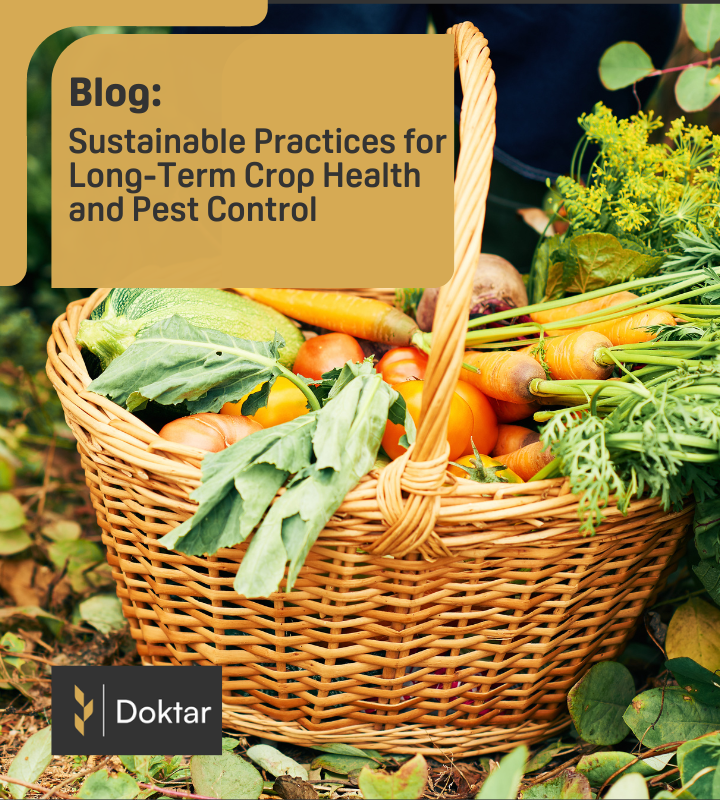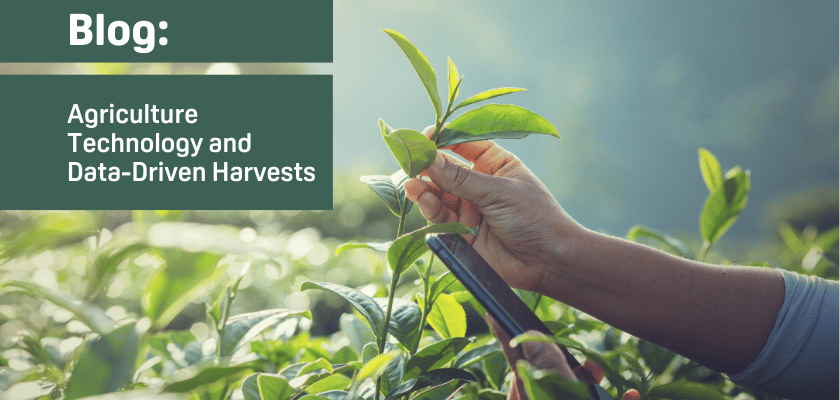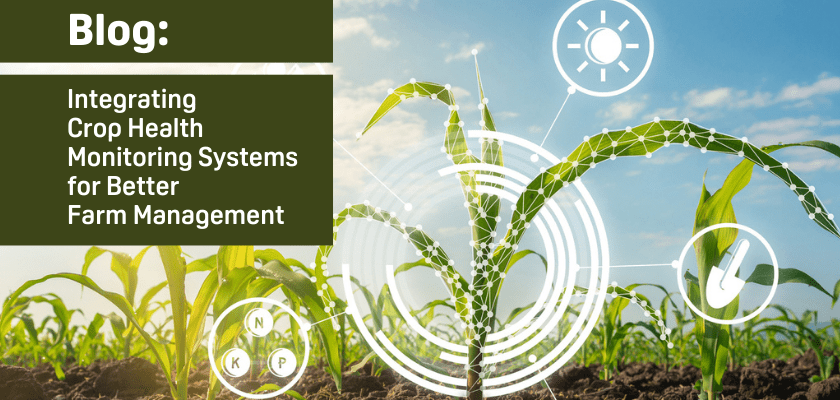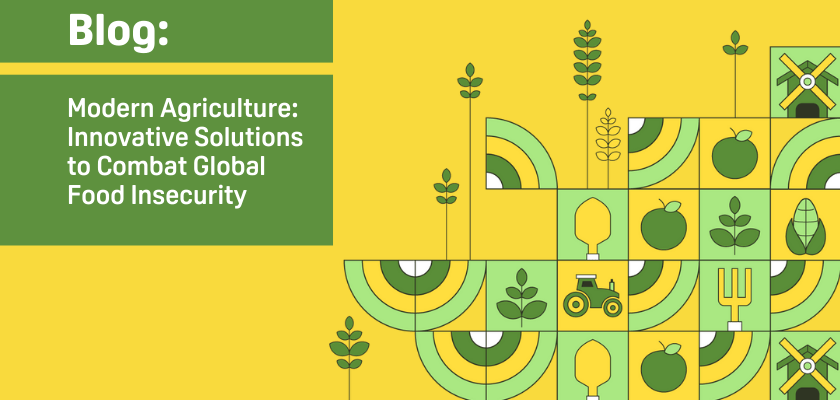

Sustainable Practices for Long-Term Crop Health and Pest Control
Sustainable crop health and pest control practices are essential for agriculture's future. This blog explores eco-friendly methods like integrated pest management and crop rotation, emphasizing Doktar's innovative solutions. Healthy crops, enhanced soil, and effective pest control techniques promote sustainable farming, protect the environment, and ensure agricultural productivity.
Published on 31 July 2024
Maintaining long-term crop health while managing pest control sustainably is crucial for the future of agriculture. This blog explores effective, eco-friendly methods to ensure healthy crops and protect the environment. We will highlight integrated pest management, crop rotation, and other sustainable farming practices that align with Doktar's innovative solutions.
What is Crop Health?
Crop health refers to the overall well-being of plants, influenced by various factors such as soil quality, water availability, pest presence, and disease occurrence. Healthy crops are more resilient to stress, yield better produce, and require fewer inputs like pesticides and fertilizers. Sustainable crop health practices ensure that these factors are managed to maintain the ecosystem's balance and promote long-term agricultural productivity.
Why is Sustainable Crop Health Important?
Sustainable crop health practices ensure farming operations' long-term productivity and profitability while minimizing negative environmental impacts. They promote biodiversity, enhance soil health, and reduce reliance on chemical inputs, leading to safer food production and a healthier ecosystem. Sustainable agriculture practices like IPM and crop rotation also help mitigate the effects of climate change by reducing greenhouse gas emissions and improving carbon sequestration in soils.
What are the Best Practices for Long-Term Crop Health?
Soil Health Management
Soil health is foundational to long-term crop productivity and sustainability. Regular soil testing and analysis are essential to understand the soil's nutrient content and pH levels, allowing for precise application of fertilizers and amendments. For instance, Doktar's SoilScanner provides quick and reliable soil analysis, offering insights into soil texture, organic matter, nitrogen, phosphorus, and more, all in just seven minutes.
Adding organic matter such as compost or manure can significantly improve soil structure, water retention, and nutrient availability. This practice supports a healthier root environment and fosters beneficial microorganisms, enhancing soil fertility and plant growth.
Crop Rotation
Crop rotation involves growing different crops in succession on the same land to disrupt pest life cycles, reduce soil erosion, and improve soil fertility. By rotating crops with varying nutrient requirements and root structures, farmers can prevent nutrient depletion and promote a balanced soil structure. For example, rotating legumes with cereals can naturally add nitrogen to the soil, reducing the need for chemical fertilizers and enhancing crop yields.
Integrated Pest Management (IPM)
Integrated Pest Management (IPM) is a holistic approach to pest control that combines biological, cultural, mechanical, and chemical methods to minimize environmental impact while effectively managing pest populations. IPM emphasizes monitoring and identifying pests accurately, which allows for the targeted application of control measures only when necessary. Doktar’s PestTrap exemplifies this approach by using AI-powered image recognition to detect and count pests in real-time, enabling timely interventions and reducing the reliance on chemical pesticides.
Cover Cropping
Cover crops like clover or rye are planted during off-seasons to cover the soil. These crops prevent erosion, improve soil fertility, suppress weeds, and enhance moisture retention. Choosing cover crops that complement the nutrient needs of the main crops can further optimize soil health. For instance, legumes as cover crops can fix nitrogen, benefiting subsequent nitrogen-demanding crops like corn.
By implementing these best practices, farmers can maintain and enhance soil health, manage pests more sustainably, and ensure long-term agricultural productivity.
What are Natural Pest Control Methods for Healthy Crops?
Biological Control
Biological control involves using natural predators and parasites to manage pest populations. This method is environmentally friendly and sustainable, as it reduces the need for chemical pesticides. Introducing beneficial insects, such as ladybugs or parasitic wasps, can reduce pest populations by preying on or parasitizing harmful insects. Enhancing the habitat to attract and support these beneficial organisms can also be effective. Planting hedgerows, cover crops, or flowering plants provides shelter and food sources for these natural predators, creating a balanced ecosystem that helps control pests.
Cultural Control
Cultural control practices modify the farming environment to reduce pest establishment, reproduction, and survival. Crop diversification, for instance, can confuse pests and reduce their spread. Growing various crops attracts a broader range of beneficial organisms and disrupts pest cycles. Maintaining proper field sanitation, such as removing plant debris and practicing good hygiene, also reduces the habitat for overwintering pests and diseases. Adjusting planting times and densities can also help avoid peak pest periods and minimize pest pressure on crops.
Mechanical and Physical Controls
Mechanical and physical controls involve manual or mechanical methods to reduce pest populations. Regular scouting and manually removing pests can be effective, especially in smaller fields or gardens. Physical barriers, such as row covers or netting, can prevent pests from reaching crops. Traps are another useful tool for managing pest populations. For example, PestTrap, an advanced pest monitoring device, captures daily images of pest populations and provides real-time data, enabling farmers to take timely action before pest levels become problematic.
Implementing these natural pest control methods can significantly contribute to maintaining healthy crops while minimizing environmental impact and promoting sustainable agricultural practices.
What are Preventive Measures for Sustainable Pest Control?
Resistant Varieties
Selecting crop varieties resistant to common pests and diseases is a key preventive measure in sustainable pest control. These resistant varieties have been bred to endure specific pests, reducing the need for chemical interventions. Farmers can minimize crop damage and yield loss by choosing resistant crops while reducing their reliance on pesticides. This approach is integral to Integrated Pest Management (IPM) and contributes to long-term agricultural sustainability.
Optimal Planting Times
Timing is crucial in pest management. Planting crops at optimal times can help them avoid peak periods of pest activity. By aligning planting schedules with pest life cycles, farmers can reduce the likelihood of infestations. Additionally, maintaining proper planting densities ensures that crops are not overly crowded, which can create favorable conditions for pests. Properly timed planting can also enhance crops' overall health and vigor, making them more resilient to pest attacks.
Healthy Soil Practices
Healthy soil is fundamental to sustainable pest control. Practices that enhance soil health, such as adding organic matter, practicing crop rotation, and using cover crops, can create a more robust and resilient growing environment. Healthy soil supports strong plant growth, which is less susceptible to pests. Additionally, well-maintained soil promotes beneficial microorganisms and natural predators that help control pest populations. Farmers can reduce pest pressures and promote sustainable agricultural practices by focusing on soil health.
Implementing these preventive measures helps manage pests more effectively and contributes to the overall sustainability and health of the farming ecosystem.
Doktar’s Role in Sustainable Agriculture
Doktar offers a range of solutions that support sustainable farming and long-term crop health:
- Filiz: This agricultural sensor station monitors soil and weather conditions, providing tailored recommendations for irrigation, disease management, and spraying decisions.
- Orbit: A field scouting app that uses satellite imagery for real-time crop monitoring. It helps detect nutrition deficiencies, crop damage, and irrigation needs early.
- PestTrap: An IoT device that identifies and counts pests, enabling precise and timely pest control measures.
- CropMap: This tool transforms agricultural data into actionable insights, helping farmers make informed decisions about crop types, boundaries, and market trends.
Conclusion
Sustainable practices for long-term crop health and pest control are essential for a resilient and productive agricultural system. Implementing integrated pest management, crop rotation, and other eco-friendly methods enhances crop yields and protects the environment. With innovative solutions from Doktar, farmers can optimize their operations, reduce input costs, and ensure the sustainability of their farming practices. By adopting these practices, we can create a healthier, more sustainable future for agriculture.

Agriculture Technology and Data-Driven Harvests
The convergence of agriculture technology and data-driven solutions represents the next frontier of innovation in farming. With companies like Doktar leading the way, farmers can leverage these advancements to improve productivity, reduce environmental impact, and secure a more sustainable future for agriculture. Whether through precision agriculture, sustainable agriculture, or cutting-edge smart agriculture technology, the future of farming is bright, and data is at the heart of this transformation. Technology's positive impact on this future should inspire and motivate us all.

Integrating Crop Health Monitoring Systems for Better Farm Management
Crop health monitoring systems revolutionize modern agriculture by enabling real-time insights into plant health, reducing losses, and promoting sustainability. Tools like Doktar’s CropMap and Orbit integrate advanced technologies, empowering farmers with data-driven decisions. By enhancing efficiency and sustainability, these systems are essential for future-proofing agricultural operations.

Modern Agriculture: Innovative Solutions to Combat Global Food Insecurity
Modern agriculture combats global food insecurity with precision agriculture, sustainable practices, and biotechnology. Tools like IoT, automation, and crop innovations optimize resource use, enhance resilience, and ensure stable food supplies. By integrating smart technologies, agribusinesses address challenges like climate change and resource scarcity, paving the way for a sustainable food future.
